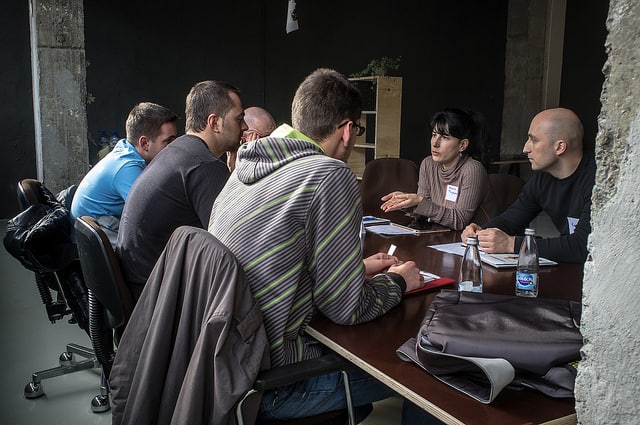As the Director of Communities at MassTLC, I hear about a lot of issues and trends happening within our tech ecosystem. The most common theme of late is tech talent in the region. Where is it, where is it going, and why is it so hard to fill seats.
Our 2016 State of Tech Report scratches the surface of what’s happening in the region but we wanted to dig a little deeper and bring together leaders in our community that are either growing their organizations or have successfully grown in Massachusetts.
Tuesday June 7th, MassTLC hosted a dinner at Catalyst in Cambridge that was graciously sponsored by Digital Realty. This event set the stage for 11 of the smartest tech executives ranging from startups to household names to share their experiences, strategies, and some hilarious stories with each other.
Below are the common problems/excuses organizations have and how our attendees overcame some of these hurdles.
Only 27% of students are staying in Massachusetts after graduation from college.
Yes, this is true, but many of that 73% weren’t Massachusetts residents before school so we can’t expect them to be locked in. We have one of the highest concentrations of higher education institutions in the country so this high percentage is a standard that we can’t do much about.
It’s really hard to compete against the big tech players with recognizable names for talent, even if you are an enterprise level company.
We found funding labs or research projects was a good way to get students to become aware of who we are and build an affinity towards our organization. This helps with recruiting them at the end of their education.
We have a hard time getting people to apply or accept offers.
Sometimes you need to look at the top. If the right leadership isn’t in place your organization can become a no-go zone no matter how much you’re paying, and if people are accepting offers to work in a place that’s not great just because the money is good, they’re not going to work out in the long run.
How do we get marketing to allow us to use our social channels as a recruiting platform?
This needs to come from the top and from HR. It’s a little more difficult when you’re a B2C but you need to sell that supporters of the organization often make the best employees and that marketing works for everyone in the organization, not just sales.
It takes so much longer to fill the mid and senior level roles but it feels like we spend all of our time reviewing or interviewing entry level candidates.
Create higher hurdles for the entry level gigs. Homework before the application can even be submitted so you know the people submitting are really interested and have some of the skills right from the start. This way you’re not wasting time and can spend more time working on mid and senior level roles.
There is a huge mid-level gap.
Separate management from mentorship and have all mid and senior level engineers mentoring lower level engineers. Too often it’s just left to managers when it needs to be a company-wide collaborative effort.
Why is everyone asking for titles that they’re not qualified for yet?
The talent crunch has changed the balance of power for some engineering specific jobs where the demand is so high that applicants shoot for the moon, and often times get it. The market is unfortunately growing faster than the skillsets. You need to be a little weary of these people. Yes, it’s great that they’re vocal about what they want which is a good asset to have on your team, but they also might be over confident and take on things which they are grossly underqualified for. This could be disastrous for your products or organization.
I need to scale my teams hype-growth style.
It’s said that doubling your teams in a year can’t/shouldn’t be done. When you try to scale too quickly you often make poor hiring decisions which leads to you either cutting some of those new hires because they don’t work out, or losing some veterans because the team dynamic has changed. You had 10 to start, you hired 10 more, but you let 2 go and 3 left due to the mess that was created, so you’re really only +5.
Where does culture fit into the importance level of applicants?
Culture fit is the MOST important part of any hire. You can teach skills but if someone can’t acclimate to the culture, it’s impossible to work around that. Bad hires are almost always due to bad culture fit and the bad ones you make are always more costly than the good ones you miss.
How big of a role does data play in your hiring?
There are lots of data points to look at, such as testing scores, and quantitative feedback from interviewers. But at the end of the day, hiring is an emotional decision. Most people have panels that decide and some even involve an advocate for the minority opinion but numbers rarely, if ever, are a final decision maker. Although, earlier in the process, they could be.
The take away from this dinner is that these leaders play a much larger role in their organization than their titles state. They are the #1 recruiters charged with thinking about how to fill the funnel and build the best team possible all while still being extremely productive in their day to day job functions. For them, their livelihoods are all about risk management, from the decisions they make on products and code to the people they hire to support them.



